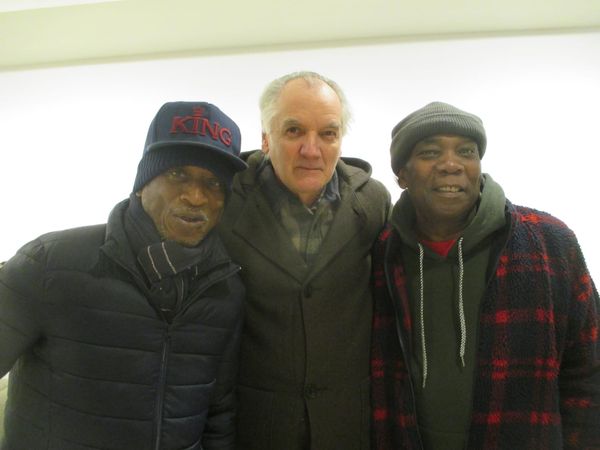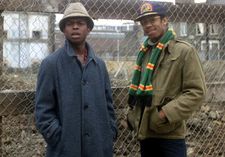At the Brooklyn Academy of Music before the US theatrical première of Babylon at BAMcinématek, Brinsley Forde spoke with me about the cast, which includes Trevor Laird, Brian Bovell, Archie Pool, Victor Romero Evans, Stefan Kalipha, Cosmo Laidlaw, Cynthia Powell, T. Bone Wilson, David N. Haynes, Mark Monero, Karl Howman, and Jah Shaka, and the film "presenting a life that the people who were in the movie, extras and all, were totally aware of."
Franco Rosso's powerful feature, with the camerawork of Chris Menges and a score by Dennis Bovell, takes you upfront into a world of survival that remains relevant today. Brinsley brings Babylon into present day England and we discuss the fashion of the time when the filming was taking place.
 |
| Brinsley Forde on Blue in Babylon: "What it was, it's a passage of learning. Coming to consciousness of life around you." |
Anne-Katrin Titze: First of all, congratulations for a great performance! Forty years later. When was the last time you saw Babylon?
Brinsley Forde: Late Nineties, 2000, the film was digitalized and we saw it in London. I'm not sure if it was at the Barbican. Afterwards there was a musical section that was really good. Obviously Franco [Rosso] was there. That was the last time I saw it, I think. I'll watch it tonight. You always find different things in it.
AKT: It's crazy that the film has its American release now, don't you think?
BF: It's become a cult classic in the UK. I mean, it was crazy. I saw once a copy for about £400, someone was selling it on Amazon. So it's been celebrated in the UK and obviously you've got friends that will tell you every single line of it or they'll phone you up and it will be a line from the movie. But this is like brand new - America. A lot of people in America haven't seen it.
AKT: On one level where people will react to the film is the fashion. You just mentioned wanting to buy a beanie and scarf earlier. [Brinsley needed to go shopping that afternoon to face the icy New York temperatures. I recommended he go to Uniqlo, right next to BAM, to stock up on basics. It turned out to be the first day of British designer JW Anderson's launch].
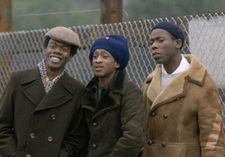 |
| Errol (David N Haynes), Blue (Brinsley Forde) and Beefy (Trevor Laird) in Babylon |
BF: A lot of the fashion was taken from what people had seen on the street. Let's be honest, a film like that had never been done before. We had The Harder They Come, the films from Jamaica, but nothing from the UK. I've heard people say it's like a time capsule. It just takes you back to the Eighties and it's because of the fashion and the style of how things were then.
AKT: Blue goes through this incredible journey and very fast.
BF: What it was, it's a passage of learning. Coming to consciousness of life around you. For most people it takes time but Blue does it through a week. Poor guy, he's thrown right into it. One of the things I do regret - because Franco wanted the movie, if possible, to have the rating that allowed everyone to see it.
AKT: And then it got an X rating - which means no children under 18.
BF: It got an X rating. And Blue's character was tempered. A lot of the fire of Blue was taken out because of the desire to get a better rating.
AKT: But it didn't help.
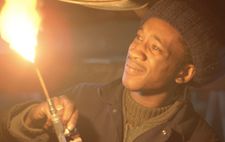 |
| Blue (Brinsley Forde) working in a garage: "It's showing life in a realistic form." |
BF: It didn't help. For young black actors around that time there wasn't that many parts that we could all identify with. It was a real opportunity for so many good actors - Trevor Laird, Brian Bovell, Victor Romero - I try to remember everyone's name.
It was the first movie that they could be what they knew, what they understood. It was presenting a life that the people who were in the movie, extras and all, were totally aware of. Because Franco had friends within that society and that ethnic group, he was comfortable. He gave people the freedom to make it real because he knew that they knew what that life was.
AKT: There is an interesting mirroring of two scenes. In the first, Blue is being chased by the police. In the second, he finds himself unwittingly on the side of the perpetrators in his girlfriend's brother's car.
BF: He doesn't really want to be there.
AKT: He doesn't want to be in the position of doing harm that had just been done to him.
BF: It's a life of contradiction. And this is what happens. I mean, in the Seventies and Eighties we had the sus law [which was repealed in 1981]. Young guys, going to the West End and they're standing there chatting. And they could be picked up for suspicion. That's what it was.
And the officers of law are in a situation that they have stereotypes - a certain kind of group of people. In reflection, we have the same thing forty years later, where you have in America Black Lives Matter. It's, as you say, a mirror where things haven't really changed. Another thing that's spoken about in the film is the National Front.
AKT: And prominently, so.
BF: I would like to look at the whole situation with a bit more thought behind it. It's easy to say "Racists! They're a bunch of racists." But really, for me racism is self-preservation of human beings. I think we all have a little bit in us. But I believe those who pull the strings in society keep us ignorant. Keep people ignorant. When we look at the National Front having these views in 1980, I believe that the same views came about when there was a referendum and now England's got the whole Brexit problem.
The actual conditions or what should have been talked about to try and get the exit were disguised by the fact that people voted against immigration and people coming into the country. As soon as people's lives feel threatened and because they are ignorant to the truth, they do the closest thing to them. All you need is someone to stoke up and say "It's these people who are doing it. They're taking away your jobs."
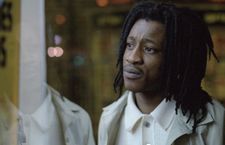 |
| Brinsley Forde on Babylon: "Music can convey a feeling, but with a movie it's something you watch and all your senses are there. They're all active. You see it, you hear it, you feel it." |
AKT: The racism in Babylon is very vocal. They are just spewing out the hatred. And right now we live in a time where people again feel emboldened, online especially, to make outrageous neo-Nazi statements that a few years ago would not have been possible.
BF: I think we have never been educated to the contributions of different races. When people are scared, and there are no job prospects for the young, it takes a few people to stoke them up and get them riled up. In the Eighties we were still a little away - apart from sport and music where there was a definite combining of cultures.
AKT: As you say, we all have to constantly work on it and check ourselves.
BF: We have to. I think what's happened is, it shifted. In the UK you have a situation where the Eastern Europeans are probably the ones that the British based people are really complaining about. It's back to the same thing, it's all to do with the economy.
AKT: You were speaking about the importance of education. I totally agree.
BF: A lot of people, if they were educated and they suddenly realised that the lightbulbs they are using, the filament was designed by Lewis Latimer. And Lewis Latimer, young black guy, was the draftsman for Edison and [Alexander Graham] Bell. How much of his ideas were done because he was the draftsman? He got the patents. We got Garrett Morgan who did the traffic lights. Marie [Van Brittan] Brown who did the cameras?
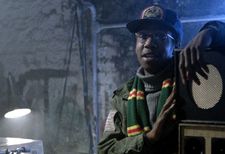 |
| Scientist (Brian Bovell): "It just takes you back to the Eighties and it's because of the fashion and the style of how things were then." |
AKT: Security cameras.
BF: Surveillance cameras. You got the guy who did the heart thing, the computer, the microphone. These are all things that young black people invented. There's so much.
AKT: And it's so little known by the majority of people.
BF: This is the problem. When we say half the story has never been told - that history has never been told. If you have the knowledge that people have contributed to your society, you're a little more like, okay.
AKT: You just suggested three fascinating biopics that should be made. Why aren't there more?
BF: Because somewhere along the line there are people who are pulling the strings and financing both sides and they probably don't want to make people aware of those things. Now that we have filmmakers who are making these films - like the film the other day with the computers when they had men going to the moon.
AKT: Hidden Figures.
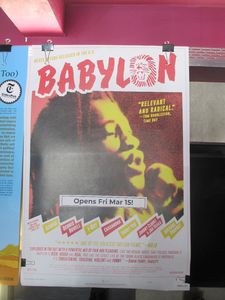 |
| Babylon poster at the IFC Center in New York Photo: Anne-Katrin Titze |
BF: Those have never been voiced before, which is, coming back to the movie [Babylon], why I think the movie is so important. It's showing life in a realistic form. Music can convey a feeling, but with a movie it's something you watch and all your senses are there. They're all active. You see it, you hear it, you feel it.
P.S. Brinsley did go to Uniqlo while I was having my conversation with Dennis Bovell and he ended up buying the JW Anderson scarf that he is wearing in the top photo and his new beanie underneath his KING baseball cap.
Read what Dennis Bovell had to say on style, substance, and scoring for the characters, and his personal connection to Babylon.
Dennis Bovell produced Cut, the début album from The Slits - Viv Albertine will be at the Glasgow Book Fair on March 30.
Babylon's premiere in Los Angeles is on March 15. The film also opens that day at the IFC Center, Kew Gardens Cinemas, Nitehawk Cinema, AMC Magic Johnson Harlem 9 and continues to run at BAMcinématek.








